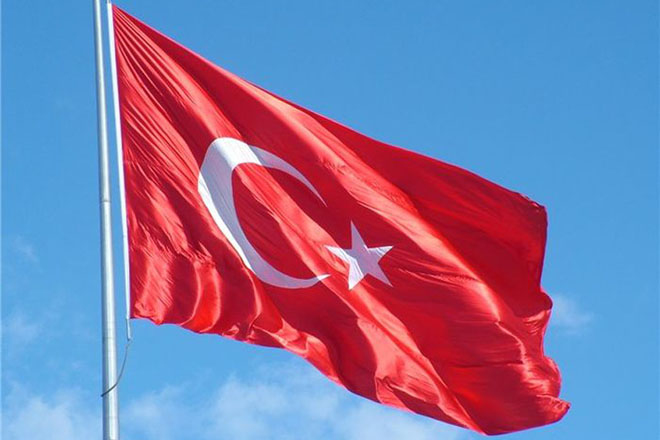Baku, Azerbaijan, Dec. 29
By Rufiz Hafizoglu - Trend:
The outgoing 2014 was rich in numerous events in Turkey's political life.
If we recall Turkey's events for the period from December 17, 2013 up till now, we can see that this year was not easy for the country.
Postmodern revolution and Fethullah Gulen
After Turkey was able to prevent a military coup according to "Balyoz" plan ("Sledgehammer") in 2010, many people believed that the political collisions completed in the country.
But Turkey's events which occurred on December 17, 2013 can be regarded as a coup organized by Fethullah Gulen's movement and directed against the government represented by the police and judicial systems.
Following a loud corruption scandal Minister of Economy Zafer Caglayan, Minister of Environment and City Planning Erdogan Bayraktar, Interior Minister Muammer Guler and Minister for EU Affairs Egemen Bakhysh were forced to resign.
The country awaited new resignations in the government, but this did not happen. The then Prime Minister Recep Tayyip Erdogan announced the new staff of the Cabinet of Ministers. Other situation could not happen in Turkey, having long state traditions.
Most important municipal elections in Turkey's history
Another important event took place in Turkey's political life on March 30, 2014: municipal elections which were extremely important for the country.
Although the preparations of the elections officially started on Feb.18, the pre-election competition in Turkey began much earlier. Both the Justice and Development Party and the opposition regarded the voting day - March 30 - as a turning point in Turkey's history. It was either win or lose. However, many were aware that the ruling party, which has been in power since 2002, that's to say, in the last 12 years, is much stronger than the opposition.
Presidential election and 'New Turkey'
Undoubtedly, another remarkable event in Turkey's political life was the presidential election that was for the first time held with people's participation on Aug.10, 2014. The vast majority of the country's population believed that Erdogan will win in the election.
Against the backdrop of the political collapse of "Muslim Brotherhood" in Egypt, Erdogan's victory in the presidential election and the victory of the Justice and Development Party in the municipal elections gave ground to say that only Turkey is the genuine adherent of "Neo-Ottomanism" in the Middle East.
By the way, Erdogan's victory gave confidence that the ruling Justice and Development Party will win in the parliamentary elections in 2015 as well.
Neighboring "Islamic State"
Announcement of the terrorist organization "Islamic State" about the creation of a "caliphate" on the territories of Iraq and Syria, and the instability in the region, could not, of course, bypass Turkey.
Many terrorist organizations would like to turn Turkey into an arena of fighting. To do this, the supporters of the terrorist Kurdistan Workers' Party, known as the PKK, and the Democratic Unity Party (PYD) held mass protests in Turkey. Their cause allegedly was a mass murder of Kurds in the Syrian town of Kobani, also known as Ayn Al-Arab.
The true purpose of the protests lied in suspending the process of "democratic solution of the Kurdish problem" (Turkish Çözüm süreci), which began in 2009 and was aimed at establishing relations with the Kurds.
Gulen movement and its confrontation with the government of Turkey
The court decision on arresting Fethullah Gulen has been a logical continuation to the confrontation between the Gulen movement and the Turkish government.
Despite declaring victory over the Hizmet movement, which is called a structure "parallel" to the government, the Turkish President Recep Tayyip Erdogan has not yet achieved Gulen's extradition from the US.
Meanwhile, this can affect the outcome of the 2015 parliamentary elections.
Changing interests of Turkey: relations with Russia, EU
One of the memorable events of 2014 became the visit of Russian President Vladimir Putin to Turkey and harsh statements of Ankara and the EU. Anti-Russian sanctions, imposed by the West after the Crimean events, became a good chance in every sense for Ankara.
Discussion of Turkish Stream gas pipeline and Akkuyu NPP construction issues by Moscow and Ankara gives grounds to claim that an alliance between Russia and Turkey, which was once only a dream, is real.
It is quite likely that the strengthening of bilateral relations of Ankara and Moscow will dramatically affect the region, in particular the interests of the countries situated in it, relegating relations with Armenia for Russia to the background.
As for the relations between Turkey and the EU, the statements of Ankara towards this structure give grounds to claim that, despite the continuation of reforms for joining the European Union, Turkey has lost interest to this organization. And this is the result of the double standards of the EU towards Turkey.
One can assume that the coming 2015 will also be remembered in Turkey by serious moments, in particular, by parliamentary election and the adoption of the new Constitution. In addition, the centenary of the so-called Armenian genocide is also a major concern.
---
Rufiz Hafizoglu is the head of Trend Agency's Arabic news service, follow him on Twitter: @rhafizoglu






